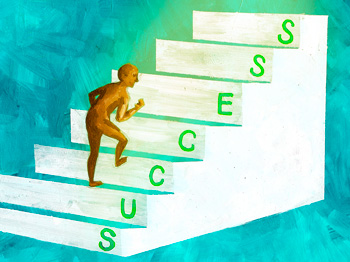My race doesn’t hold me back
‘‘I want you to do problem number five from tonight’s homework assignment right now,” my calculus teacher said. I started the problem but I got stuck on the first step. I had no idea what to do. “Why can’t I get this?” I kept thinking. I looked around and noticed only white and Asian students. Even my teacher was Japanese. Was I really the only Latino in the room? It can’t be, the magnet I’m in at Venice High is 43 percent Hispanic. I wondered why there weren’t more in my class. One of the students turned around and said, “That was easy, huh?” It seemed like I was the only one stuck. Was it because I’m Latino?
I’ve always wondered, does my race hold me back? When I was younger and people asked, “What are you?” I’d say Latino but I wished I could say white because of the stereotypes I saw growing up. On the news, I’d hear a story about an innocent boy killed and a Latino was suspected. On the Spanish language news they’d talk about the conditions Latinos worked in, selling fruit on the streets or working at jobs that aren’t high-paying, like construction workers and house cleaners, because they’re here illegally. The news made it seem like we were all struggling. I thought calling myself Latino meant being part of a culture that wasn’t as important as the rest of American society. I began to feel that my race was inferior to other races.
My parents would tell my siblings and me when we started to slack off on our schoolwork, “Do you want to end up like us? Working hard for little money?” Both of my parents were born and raised in El Salvador and immigrated to the United States. My mom was 17 and my dad was 18. They came because there weren’t jobs and because of the civil war. My dad works as a bicycle mechanic and my mother works at a factory that makes boxes. I felt like if I didn’t work hard, I was going to end up like them, living a hard life with low-paying jobs stressed about keeping the house and paying for their children’s college educations.
I saw Latinos as teachers, not doctors
I began to do well in school and knew I would one day attend college. But I always seemed to underestimate myself. When my parents were talking to my other family members, they’d say, “Edgar is going to be a doctor.” They thought that was the best job you could have and money wouldn’t be a problem if I was a doctor. I’d think, “Is that even a possibility?” I never saw a Latino doctor. I only saw them as patients, nursing assistants or the staff telling you to fill the papers out. In my old neighborhood, I didn’t know a single person who attended college and my teenage neighbor got pregnant. I thought it was normal since I saw pregnant Latina girls in middle school and riding the bus. I wanted to become a teacher because I did see Hispanic teachers so I thought that was a career I could have.
When I went to Dorsey High School, it was easy to get As. I didn’t feel like it was preparing me to go to college because, after years of hearing my teachers say college wasn’t going to be easy, I wanted to make sure I was challenged. Toward the end of my freshman year, I asked my dad if I could transfer. I was accepted into Venice High, and later that year into the magnet program. I was looking at schools that were close to my house, and from reading online reports, I saw that Venice was a good school. Once I was there, I found out that the magnet offered more challenging classes and had the better teachers.
It took time to adjust to being in classes with mostly white and Asian students. They participated more and it seemed like they already knew what we were learning about. Junior year I was getting As, Bs and a C, but I saw most of my classmates getting straight As. That used to be me, and I realized I used to be in classes with mostly Latino and black students. In a way, it seemed to me as if we were not as smart as white and Asian students.
My parents couldn’t help me with my homework
For the first time, I was struggling in math. After every test, my teacher would tape the A tests on the board with a big sticker on them. After the first couple of tests, I stopped looking for my tests on the board and went straight to the teacher’s desk for the few tests that weren’t As. I asked my classmates, “How do you do so well?” A couple of them said that they got private tutoring after school and that their parents helped them out, since they had taken calculus in high school and college. I couldn’t afford professional tutoring, and my parents weren’t able to help me. My dad went to school up to fifth grade and my mom went up to sixth grade in El Salvador. They didn’t know multiplication or division or how to read English. I thought, “Of course I’m going to get a B.” It made sense that if you get help you’re going to do better. I thought it was unfair but that’s just how things are. Colleges would compare me to someone from my school who had better grades, and I’d probably not get accepted to the best school because of that.
Near the end of my junior year, I heard about a week-long summer program called Chicano Latino Youth Leadership Project (CLYLP) held in Sacramento. My friend and I applied because we thought it would look good on our college applications and provide useful information about college.
That week, I met Latinos who went to colleges like UCLA and Brown, who were fluent in English and had made contributions to this country. Dolores Huerta, co-founder of the United Farm Workers of America, came to speak to us. I’d heard her name before, but didn’t know what she did. She told us that she was raised in the San Joaquin Valley in Central California. Her mother owned a hotel and often housed farm worker families for free. She told us about standing up at a protest with her infant son, and when cops told her to leave she refused. She was arrested and went to jail with her son. She was an inspiration because she stood up for what she believed in.
Huerta and César Chávez organized a strike to improve conditions for people who picked grapes for little pay. What started off as a small group ended up with more than 5,000 grape workers walking off their jobs to strike. I pictured her leading the strike with thousands of followers. She came from a humble beginning and was doing things even more privileged people weren’t. I realized anyone could achieve regardless of their background.
The program also gave us information about college. People gave us advice on how to fill out our college applications and write our personal statements.
On the fifth day we sat down individually with college advisors who reviewed our transcripts. I was seated with a woman named Shayla, who asked me what colleges I was applying to. I said “Just Cal States and UCs.” Everyone I knew like me—from “the ghetto”—had parents who couldn’t help them out with the college admission process and went to a community college or a Cal State. She said, “What about a school like Columbia? Or Yale?” She said that with my grades, potential and extracurriculars, I could go wherever I wanted. I began to think, “Why not? Why can’t I go to one of these schools?” I was getting a lot of good information about presenting myself well to colleges, plus to be a part of CLYLP I had to get selected, so obviously they saw something in me.
Shayla motivated me not to think about college as a transition like the one from middle school to high school, where you attend the closest school to your house. Instead I have thousands of schools to choose from. The only thing stopping me from going to the best schools was me. I’m not trying to say that I need to go to a prestigious college, but just knowing that I have the potential to go and hearing that felt amazing. As I was getting ready to leave the room, she gave me her card and offered to help revise my personal statements. I think she did that because she felt that there were fewer black and Hispanic students going to top schools and that was her way of helping. She wouldn’t have said that to someone she didn’t think could go to a top school. I realized that people did believe in me and I should too.
Because of the program, I knew I was just as smart as anyone who tries hard and I could achieve things that I thought only wealthy whites and Asians could.
I felt confident applying to college
When I returned home, I worked on my personal statements and made a list of schools I might apply to. I decided to apply to a few UCs, private liberal arts colleges including Middlebury, Bates, Bucknell, Pitzer and Whitman, and yes even Ivy Leagues: Dartmouth, Cornell and Columbia. Even though tuition is higher at private schools, some have more money to give to students than public schools so it would most likely be less expensive.
Senior year I felt a new sense of pride and I wasn’t going to hide anymore because I was Hispanic. In my English class, we read one of the most difficult books I have ever read, Heart of Darkness by Joseph Conrad. I asked questions when I didn’t get something and participated in discussions even if I misunderstood a concept.
In my second-year calculus class, I proved to myself that I don’t have to be left behind because of my race. Instead of making excuses, I tried even harder. I stayed after school to get help from classmates and my teacher and I did a lot of practicing, doing problem after problem until I knew how to do the problems without help. I have my well-deserved A.
One day in class, I heard a group of students behind me talking about race. One of them, who was Chinese, said, “I think Asians should be the superior race.” I turned around and said, “What the hell are you talking about? There’s no superior race.” I was mad. Now that I think about it, many people at my school see Asians excelling, so they must think they’re the best. I’m glad I spoke up because I’m proud of being Latino.
We are all capable of doing great things, whether we are Latino, white, poor, middle-class, highly privileged or disadvantaged. I don’t feel like I can’t do anything because of my race. Being raised in “the hood” and being a minority isn’t an excuse to perform poorly. I can’t wait to go to college now, knowing that I made it there and that my race doesn’t stop me from succeeding.



